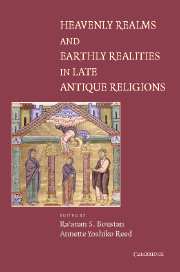Book contents
- Frontmatter
- Contents
- Preface
- List of Contributors
- Introduction: “In Heaven as It Is on Earth”
- PART ONE BETWEEN EARTH AND HEAVEN
- PART TWO INSTITUTIONALIZING HEAVEN
- PART THREE TRADITION AND INNOVATION
- 11 Angels in the Architecture: Temple Art and the Poetics of Praise in the Songs of the Sabbath Sacrifice
- 12 The Collapse of Celestial and Chthonic Realms in a Late Antique “Apollonian Invocation” (PGM I 262–347)
- 13 In Heaven as It Is in Hell: The Cosmology of Seder Rabbah di-Bereshit
- 14 The Faces of the Moon: Cosmology, Genesis, and the Mithras Liturgy
- 15 “O Paradoxical Fusion!”: Gregory of Nazianzus on Baptism and Cosmology (Orations 38–40)
- Select Bibliography
- Index
13 - In Heaven as It Is in Hell: The Cosmology of Seder Rabbah di-Bereshit
Published online by Cambridge University Press: 14 July 2009
- Frontmatter
- Contents
- Preface
- List of Contributors
- Introduction: “In Heaven as It Is on Earth”
- PART ONE BETWEEN EARTH AND HEAVEN
- PART TWO INSTITUTIONALIZING HEAVEN
- PART THREE TRADITION AND INNOVATION
- 11 Angels in the Architecture: Temple Art and the Poetics of Praise in the Songs of the Sabbath Sacrifice
- 12 The Collapse of Celestial and Chthonic Realms in a Late Antique “Apollonian Invocation” (PGM I 262–347)
- 13 In Heaven as It Is in Hell: The Cosmology of Seder Rabbah di-Bereshit
- 14 The Faces of the Moon: Cosmology, Genesis, and the Mithras Liturgy
- 15 “O Paradoxical Fusion!”: Gregory of Nazianzus on Baptism and Cosmology (Orations 38–40)
- Select Bibliography
- Index
Summary
“For [God] is on the earth below exactly as in the heavens above.”
(Shneur Zalman of Lyadi)The most comprehensive Jewish cosmological tractate handed down to us from Late Antiquity, probably from the post-talmudic/early geonic period, is commonly known as Seder Rabbah di-Bereshit [“The Greater Order of Creation”]. It has never been edited in a critical edition, nor has it been adequately translated into a modern language. The manuscript tradition varies greatly as far as its structure, its contents, and even its title are concerned. The most common title, attested in the majority of manuscripts, is not Seder Rabbah di-Bereshit (in fact, this title is suggested in only one manuscript), but rather Maʿaseh Bereshit [“The Work of Creation”]. This, of course, is an allusion to the famous mishnah in m. Ḥagigah 2:1:
The laws of prohibited sexual relationships [ʿarayot] may not be expounded by [or: to] three persons, nor the “Work of Creation” [maʿaseh bereshit] by [or: to] two, nor the chariot [merkavah] by [or: to] an individual, unless he is a sage and understands on his own.
Anyone, who looks into [mistakkel be-] four things, it would be merciful for him if he had not come into the world: what is above, and what below, what is before, and what after.
Anyone, who has no concern for the glory of his creator, it would be merciful for him if he had not come into the world.
- Type
- Chapter
- Information
- Heavenly Realms and Earthly Realities in Late Antique Religions , pp. 233 - 274Publisher: Cambridge University PressPrint publication year: 2004
- 2
- Cited by



